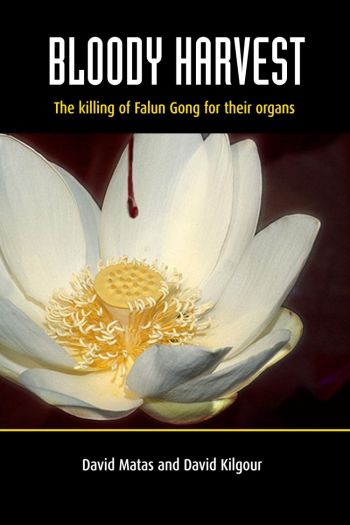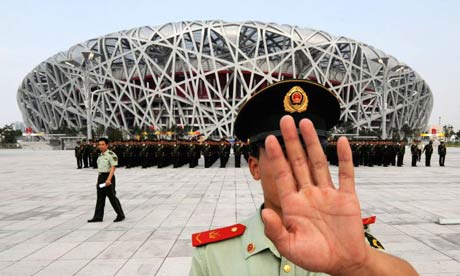Rising unrest in China(3): Pollution
Posted by Author on July 21, 2006
By Luis Ramirez, from Jilin City, China–VOA/
China’s rapid economic growth has come at the expense of its environment, with massive chemical spills and other pollution disasters ruining the land and health of many peasants. In some cases, severe pollution has prompted violent protests – adding to the rising unrest the country has experienced over the past few years. One of the more publicized disasters happened last November, when explosions at a chemical plant in northeastern China’s Jilin City sent 100 metric tons of benzene and other chemicals into the Songhua River.
Water drips from melting icicles off the roof of a hut along the banks of the Songhua River, signaling the arrival of spring in northeastern China’s Jilin province.
Just a few kilometers upstream, explosions last November ripped through a petrochemical plant, releasing an 80-kilometer long slick of benzene and other toxins. The chemicals flowed past this village, unbeknownst to residents.
One 29-year-old woman says she heard the blast, but was reassured when state television said all was fine and there was no contamination in the river.
Days later, after first concealing news of the spill, the government had to shut off water to Harbin, a city of four million people along the river. At that point, tests showed benzene levels were 108 times higher than is considered safe. But villagers along the river recently said they never received any warnings.
Many continue to drink water from wells near the river, eat fish from the river, and use river water for their farm animals and crops.
This woman pouring water into a trough for her ducks and chickens says no health workers or government officials have come to offer assurances or information.
“The water is not affected. The government said it opened a reservoir to flush out the polluted water, and we cannot see any pollution. We live on the banks of the river here, and we do not see anything abnormal,” she said.
Only a few villagers say they are worried about the benzene, which can cause cancer and birth defects.
Government critics say the Songhua incident highlights the inequity that China’s peasants endure. They say authorities are more concerned with appeasing better-educated urban residents who are more likely to raise questions than are farmers who are ignorant of the pollution’s dangers. Fear of urban unrest may have been one reason the authorities acted to protect Harbin.
The spill became an international issue, since the polluted water flowed into Russia. Political analysts say Moscow’s concerns probably forced the government to publicize the incident and to remove many officials from their jobs in response.
Wenran Jiang heads the China Institute at Canada’s University of Alberta and analyzed Chinese media reports of the spill. He says there was a strong effort to publicize the firings and other government actions.
“Image-building process was probably louder than taking care of the polluted river,” said Wenran Jiang. “But the sad part of this entire thing is that the city people probably got some of these benefits and then they believed all this propaganda. But what about the rural areas?”
Professor Jiang says that for villagers, the lack of obvious short-term effects from the spill and ignorance of the longer-lasting health risks helped stave off public anger.
Keeping a lid on unrest has been tougher elsewhere. A year ago, tens of thousands of villagers protested in Huaxi village, in central China’s Zhejiang province, after pollution from chemical plants ruined crops and caused health problems, such as cancer and stillbirths.
Two witnesses describe how villagers took to the streets.
FIRST MAN: “No one could do anything to stop these people, as this place is remote – far from government control.”
SECOND MAN: “So, the farmers took action. They sat and slept on the road, preventing trucks carrying materials from entering the plants. They had no choice.”
FIRST MAN: “They live off their land and they could not even grow vegetables because it was so polluted.”
The factories now sit empty, the government shut them down to appease the villagers. However, authorities also sentenced at least nine protesters to prison.
The Huaxi riot and similar incidents have helped the government realize the need for reforms. Elizabeth Economy is the director of Asia studies at the Council on Foreign Relations, a New York research group, and has written about pollution and politics in China.
“There’s no doubt that the government is fearful of this social unrest and that’s why they closed the factories and will remove, in some cases, local officials. They did try to find some local officials to hold responsible,” she said.
The central government has acted to improve the response to environmental disasters, and to protect peasant land rights. However, Economy says the new policies have not reached local officials, and without their support, little will change.
“You are simply not going to be able to pluck out every corrupt official or every head of a polluting factory who doesn’t do the right thing in China,” she continued. “This is an endemic problem. You need to have a system that makes local officials and business leaders more accountable. You need greater transparency.”
An environmentalist in Beijing who asked not to be named says that like the ice that has melted along the banks of the Songhua, eventually there will be political reform in China. But, she says that for now, the Communist authorities fear that greater openness will reduce, and eventually end, the party’s power.
Rising unrest in China: (1) (2) (3) (4)
Book to read: A Survey of Chinese Peasants
Rate this:
Share this:
- Click to email a link to a friend (Opens in new window)
- Click to share on Twitter (Opens in new window)
- Click to share on Facebook (Opens in new window)
- Click to share on Tumblr (Opens in new window)
- Click to share on Pinterest (Opens in new window)
- Click to share on Reddit (Opens in new window)
- Click to share on LinkedIn (Opens in new window)
- Click to print (Opens in new window)
Related
This entry was posted on July 21, 2006 at 2:00 pm and is filed under Economy, Environment, People, Rural, Social, Special report. You can follow any responses to this entry through the RSS 2.0 feed. Both comments and pings are currently closed.
Sorry, the comment form is closed at this time.





